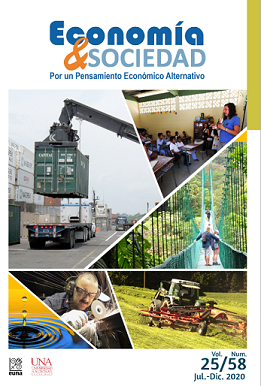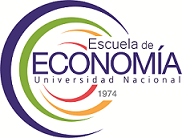Implementation of the fiscal rule in Costa Rica
DOI:
https://doi.org/10.15359/eys.25-58.1Keywords:
fiscal deficit, fiscal policy, public debt, public finances, coronavirusAbstract
As a consequence of the increasing deterioration of public finances in the last ten years, Costa Rica approved a fiscal rule that links growth of public spending with growth of national production and level of public debt. The rule was implemented in 2020. The objective of this article is to highlight the risk of adverse results if the fiscal rule restricts public expenditure excessively. Regarding the verification of compliance with the fiscal rule, according to the Ministry of Treasury the budget formulated for the respective year should be used as a parameter, while according to the Comptroller General of the Republic what must be used is the budget effectively executed by each of the public entities. A simple linear simulation model is applied here to calculate the possible trends that public spending will follow when using each of the indicated parameters for verification. It is concluded that a very restrictive interpretation of the fiscal rule could generate unwanted results. In addition, it is pointed out that with the health emergency caused by the Coronavirus, the fiscal rule rather restricts the government’s freedom when greater flexibility is needed to manage the fiscal policy.
References
Asamblea Legislativa. (2018). Ley 9635, de Fortalecimiento de las Finanzas Públicas. Recuperado de http://www.pgrweb.go.cr/scij/Busqueda/Normativa/Normas/nrm_norma.aspx?param1=NRM&nValor1=1&nValor2=87720&nValor3=118801&strTipM=FN
Barreix, A., & Corrales, L. (2019). Reglas Fiscales Resilientes en América Latina. Doi: http://dx.doi.org/10.18235/0002003
Banco Central de Costa Rica. (2020a). Programa Macroeconómico 2020-2021. Recuperado de https://activos.bccr.fi.cr/sitios/bccr/publicaciones/DocPolticaMonetariaInflacin/Programa_Macroeconomico_2020-2021.pdf
Banco Central de Costa Rica. (2020b). Aplicación de la Regla Fiscal. En Comunicados de Prensa. Recuperado de https://www.bccr.fi.cr/seccion-comunicados-de-prensa/comunicados-de-prensa
Comisión Económica para América Latina y el Caribe. (2020). Coyuntura, escenarios y proyecciones hacia 2030 ante la presente crisis de Covid-19. En Presentaciones. Recuperado de https://www.cepal.org/es/presentaciones/coyuntura-escenarios-proyecciones-2030-la-presente-crisis-covid-19
Contraloría General de la República. (2020). Ampliación de criterio sobre expediente legislativo N.° 21.573. En Oficio DFOE-SAF-0073. Recuperado de http://cgrfiles.cgr.go.cr/publico/docs_cgr/2020/SIGYD_D_2020002020.pdf
Corrales, G. (2020, Abril 4). Un llamado a la cordura en los «Tiempos del COVID-19». La Revista.cr. Recuperado de https://www.larevista.cr/gerardo-corrales-un-llamado-a-la-cordura-en-los-tiempos-del-covid-19/
Oviedo, E. (2020, Marzo 19). Gobierno propone destinar ¢1 billón a atender efectos de emergencia por covid-19. La Nación. Recuperado de https://www.nacion.com/el-pais/politica/gobierno-pretende-destinar-1-billon-a-atender/XSBLAPE46VBQJAFOK5TRIVUOZM/story/
Leitón, P. (2020, Abril 30). Gobierno proyecta bajar histórico déficit a 8.6% del PIB, pero requiere aprobación de nuevas leyes. La Nación. Recuperado de https://www.nacion.com/economia/politica-economica/gobierno-proyecta-bajar-historico-deficit-a-8/TKGXDL6NMVHQHJHU7SONATEAYA/story/
Ministerio de Hacienda. (2019). Marco fiscal presupuestario de mediano plazo 2019-2023. Recuperado de https://www.hacienda.go.cr/docs/5d6713c34036d_Marco%20Fiscal%20Mediano%20Plazo%202019-2023.pdf
Casa Presidencial de Costa Rica. (2020). Decreto fija parámetros para la aplicación de la Regla Fiscal. En Comunicados. Recuperado de https://www.presidencia.go.cr/comunicados/2020/02/decreto-fija-parametros-para-la-aplicacion-de-la-regla-fiscal/
Estrada P., M. F. (2020, Abril 24). Economía de Costa Rica decrecerá un 3,6% en el 2020 debido al COVID-19, según Banco Central. Semanario Universidad. Recuperado de https://semanariouniversidad.com/ultima-hora/economia-de-costa-rica-decrecera-un-36-en-el-2020-debido-al-covid-19-segun-banco-central/
Thomsen, P. (2020, Marzo 30). Europe’s COVID-19 Crisis and the Fund’s Response. En INFBlog. Recuperado de https://blogs.imf.org/2020/03/30/europes-covid-19-crisis-and-the-funds-response/?utm_medium=email&utm_source=govdelivery
Published
How to Cite
Issue
Section
License
This publication is subject to the Creative Commons License; therefore, its attributions and restrictions must be respected.
Authors publishing in this Journal accept the following conditions:
- Authors retain copyright ownership and give the Journal first publication right of the paper, which is registered with the Creative Commons Attribution-NonCommercial-ShareAlike 4.0 International License. This license allows third parties to use the published work provided it is sourced as firstly published in this Journal.
- Authors may enter into other independent and additional contractual agreements for the non-exclusive distribution of the article published in this Journal (e.g., to be included in an institutional repository or published in a book) provided it is clearly stated that the work was published in this Journal for the first time.
- Authors are allowed and recommended to publish their work on the Internet (for example, on institutional or personal pages) before and during the review and publication process, as it can lead to productive exchanges and a greater and faster dissemination of work published.

The Economía & Sociedad Journal, published by Universidad Nacional, is licensed under a Creative Commons Reconocimiento-NoComercial-CompartirIgual 4.0 Internacional License. Based on http://www.revistas.una.ac.cr/index.php/economia.








